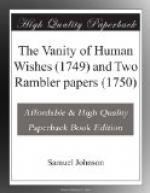Every Man is sufficiently discontented with some Circumstances of his present State, to suffer his Imagination to range more or less in quest of future Happiness, and to fix upon some Point of Time, in which he shall, by the Removal of the Inconvenience which now perplexes him, or the Acquisition of Advantage which he at present wants, find his Condition of Life very much improved.
When this Time, which is too often expected with great Impatience, at last arrives, it generally comes without the Blessing for which it was desired; but we solace ourselves with some new Prospect, and press forward again with equal Eagerness.
It is some Advantage to a Man, in whom this Temper prevails in any great Degree, when he turns his Hopes upon Things wholly out of his own Power, since he forbears then to precipitate his Affairs, for the Sake of the great Event that is to complete his Felicity, and waits for the blissful Hour, without neglecting such Measures as are necessary to be taken in the mean Time.
I have long known a Person of this Temper, who indulged his Dream of Happiness with less Hurt to himself than such chimerical Wishes commonly produce, and adjusted his Scheme with such Address, that his Hopes were in full bloom three parts of the Year, and in the other part never wholly blasted. Many, perhaps, would be desirous of learning by what Means he procured to himself such a cheap and lasting Satisfaction. It was gained only by a constant Practice of referring the Removal of all his Uneasiness to the Coming of the next Spring. If his Affairs were disordered, he could regulate them in the Spring; if a Regimen was prescribed him, the Spring was the proper Time of pursuing it; if what he wanted was at a high Price, it would fall its Value in the Spring.
The Spring, indeed, did often come without any of these Effects; but he was always certain that the next would be more propitious; and was never convinced that the present Spring would fail him until the Middle of Summer; for he always talked of the Spring as coming ’till it was past, and when it was once past, every one agreed with him that it was coming.
By long Converse with this Man, I am, perhaps, in some Degree brought to feel the same immoderate Pleasure in the Contemplation of this delightful Season; but I have the Satisfaction of finding many, whom it can be no Shame to resemble, infected with the same Enthusiasm; for there is, I believe, scarce any Poet of Eminence, who has not left some Testimony of his Fondness for the Flowers, the Zephyrs, and the Warblers of the Spring. Nor has the most luxuriant Imagination been able to describe the Serenity and Happiness of the golden Age otherwise than by giving a perpetual Spring, as the highest Reward of uncorrupted Innocence.
There is, indeed, something inexpressibly pleasing in the annual Renovation of the World, and the new Display of the Treasures of Nature. The Cold and Darkness of Winter, with the naked Deformity of every Object on which we turn our Eyes, makes us necessarily rejoice at the succeeding Season, as well for what we have escaped, as for what we may enjoy; and every budding Flower, which a warm Situation brings early to our View, is considered by us as a Messenger, to inform us of the Approach of more joyous Days.




